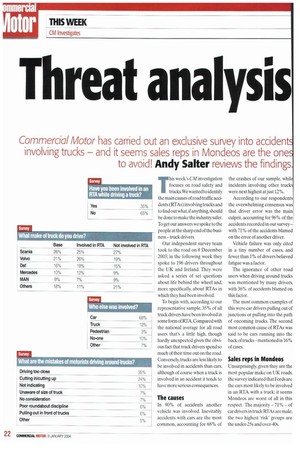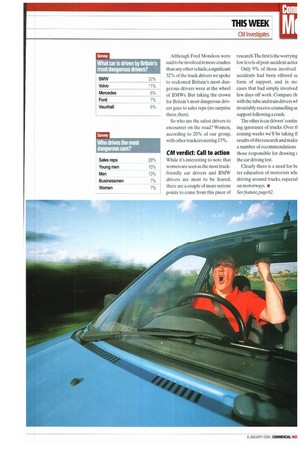Threat analysis
Page 22

Page 23

If you've noticed an error in this article please click here to report it so we can fix it.
Commercial Motor has carried out an exclusive survey into accident involving trucks — and it seems sales reps in Mondeos are the one to avoid! Andy Salter reviews the findings.
This week's CM investigation focuses on road safety and trucks. We wanted to identify the main causes of road traffic accidents (RTAs) involving trucks and to find out what, if anything, should be done to make the industry safer. To get our answers we spoke to the people at the sharp end of the business—truck drivers.
Our independent survey team took to the road on 8 December 2003; in the following week they spoke to 196 drivers throughout the UK and Ireland. They were asked a series of set questions about life behind the wheel and, more specifically, about RTAs in which they had been involved.
To begin with, according to our representative sample, 35% of all truck drivers have been involved in some form of RTA. Compared with the national average for all road users that's a little high, though hardly unexpected given the obvious fact that truck drivers spend so much of their time out on the road. Conversely, trucks are less likely to be involved in accidents than cars, although of course when a truck is involved in an accident it tends to have more serious consequences.
The causes
In 90% of accidents another vehicle was involved. Inevitably accidents with cars are the most common, accounting for 68% of the crashes of our sample, whil incidents involving other truck were next highest at just 12%.
According to our respondents the overwhelming consensus was that driver error was the main culprit, accounting for 96% of the accidents recorded in our survey — with 71% of the accidents blamed on the error of another driver.
Vehicle failure was only cited in a tiny number of cases, and fewer than 1% of drivers believed fatigue was a factor.
The ignorance of other road users when driving around trucks was mentioned by many drivers, with 36% of accidents blamed on this factor.
The most common examples of this were car drivers pulling out of junctions or pulling into the path of oncoming trucks. The second most common cause of RTAs was said to be cars running into the back of trucks — mentioned in 16% of cases.
Sales reps in Mondeos
Unsurprisingly, given they are the most popular make on UK roads, the survey indicated that Fords are the cars most likely to be involved in an RTA with a truck: it seems Mondeos are worst of all in this respect. The majority — 71% — of car drivers in truck RTAs are male: the two highest 'risk' groups are the under-25s and over-40s. Although Ford Mondeos were said to be involved in more crashes than any other vehicle, a significant 32% of the truck drivers we spoke to reckoned Britain's most dangerous drivers were at the wheel of BMWs. But taking the crown for Britain's most dangerous drivers goes to sales reps (no surprise there, then).
So who are the safest drivers to encounter on the road? Women, according to 20% of our group, with other truckers scoring 13%.
CM verdict: Call to action While it's interesting to note that women are seen as the most truckfriendly car drivers and BMW drivers are most to be feared, there are a couple of more serious points to come from this piece of research.The first is the worrying low levels of post-accident actioi Only 9% of those involved accidents had been offered al form of support, and in mc cases that had simply involved few days off work. Compare th with the tube and train drivers wl invariably receive counselling at support following a crash.
The other is car drivers' contin ing ignorance of trucks. Over ti coming weeks we'll be taking 11 results of this research and makii a number of recommendations those responsible for drawing the car driving test.
Clearly there is a need for be ter education of motorists Alf driving around trucks, especial on motorways.
See feature, page 62.
















































































































































































